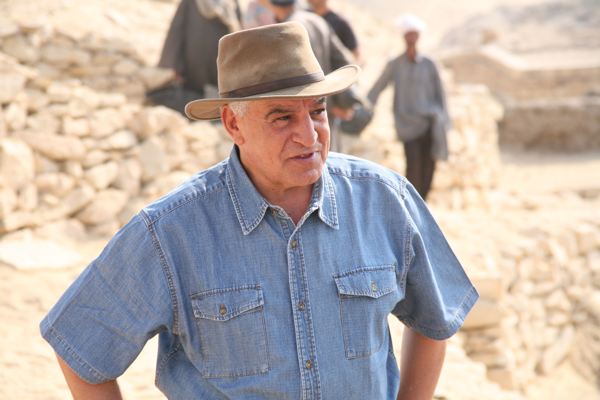
Egypt’s former antiquities minister Zahi Hawass has been accused of helping three Germans to steal rocks and samples of a cartouche from the Pyramid of Cheops at Giza, the Guardian reported.
The three men were sentenced in absentia on Tuesday of last week, together with six Egyptians who helped them commit the deed. According to AFP, they were condemned to five years in jail.
Dominique Görlitz, Stefan Erdmann, and Peter Hoefer entered the inner sanctum of the pyramid in April 2013 and took the samples, supposedly with the intention of proving that Egypt’s best-known monument wasn’t built, as is widely agreed upon, for Pharaoh Khufu but in fact belongs to another, much older dynasty.
The group brought the pieces back to Germany, but Egyptian authorities announced in August of this year that the artifacts had subsequently been recovered.
Hawass is accused to have been the one who facilitated the theft based on his involvement in a 2010 documentary about the Pyramid of Cheops’s cartouche. That the country’s antiquities minister would be involved in such a theft is perhaps intriguing enough in and of itself.
However, Hawass’s case gets better. Beside his political career, he is something of a celebrity archeologist with several documentaries and even a clothing line to his name. Some have reportedly gone as far as to call him the Egyptian Indiana Jones, after the popular film character.
Denying Theft Claims
Hawass left the government in the wake of the Egyptian revolution in 2011. He vehemently denies the theft claims currently against him, pointing out that he wasn’t in office when the Germans entered the pyramid.
“There is nothing against me,” Hawass told the Guardian. “I just have to go to the district attorney to prove that what happened in 2010 was according to the law.”
The looting of ancient artifacts in an old problem in the country, but political instability has exacerbated the issue. Former minister for antiquities Mohamed Ibrahim Ali, then minister for antiquities, told the Washington Post this past June: “In Egypt, when you dig, you find something. So some gangs have started to become active very quickly because of the breakdown of the police force.”
New technologies, including DigitalGlobe and Google Earth, are now used by the authorities to locate and monitor looting “hot spots.” Yet the task remains herculean—and many looters continue to go unnoticed.
As the Germans and their accomplices were sentenced last week, an Egyptian grocer was arrested on a road south of Giza with 23 ancient artifacts hidden in food packages. According to a DPA report, these are now to be handed over to the antiquities ministry for examination.